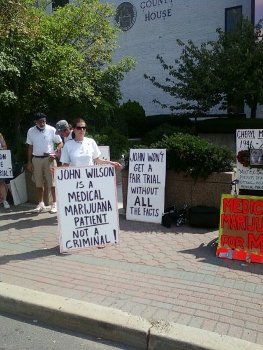The war in Afghanistan, the rising tide of drug reform in Latin America, and battles over drug policies in European countries are among the dominant international drug policy stories of 2009. (Next issue we'll review the top domestic stories.)
And then there were 14! The last congressional obstacle to the District of Columbia actually being able to implement its medical marijuana law has fallen. Now, DC bureaucrats and would-be medical marijuana entrepreneurs are scrambling.
Unprecedented developments have us more optimistic than ever before at the prospects for significant change in drug policy.
Will 2010 be the year the first state legalizes marijuana? If California Assemblyman Tom Ammiano and Washington Representative Roger Goodman have their way, two states will do so.
The Mexican government scored a victory this week with the killing of Beltran Leyva cartel head Arturo Beltran Leyva, but will it turn out to be a pyrrhic victory? Knocking off cartel heads in the past has typically led to renewed infighting as rivals vie to replace them.
A quiet week -- perhaps it's the holidays -- yields a Carolina two-fer of corrupt cops.
New Jersey medical marijuana patient John Ray Wilson was found guilty of marijuana manufacture yesterday, but the jury refused to convict him on the most serious charge. The verdict came after the trial judge partially reversed himself and allowed Wilson to utter one sentence to the jury about his illness and his use of medical marijuana. Supporters are seeking a pardon from outgoing Gov. Jon Corzine.
The Wisconsin medical marijuana bill was only introduced last month, but Tuesday it got a joint hearing from the Assembly and Senate Health Committees. The Democratic legislative leadership and the Democratic governor are all on board, so it could move quickly.
The Ohio Supreme Court has taken a stab at a largely yet-to-be-adjudicated area of Fourth Amendment law. In a ruling Tuesday, it held that police must obtain a search warrant to search an arrestee's cell phone.
On New Year's Day, the Czech Republic will join Portugal among European countries that have decriminalized drug possession for personal use. The Czech cabinet Monday approved quantity limits on the amounts that will be decriminalized.
It has been eight years since Jamaica's National Commission on Ganja recommended decriminalization. Now, a leading lawmaker is trying to reactivate the debate.
Events and quotes of note from this week's drug policy events of years past.
Do you read Drug War Chronicle? If so, we need your feedback to evaluate our work and make the case for Drug War Chronicle to funders. We need donations too.
"NJ Medical Marijuana Patient Not Guilty on First-Degree Felony Charges," "There's No Economic Crisis for the Drug Cartels," "Another Crazy Medical Marijuana Lie from the Drug Czar," "NJ Medical Marijuana Trial Takes an Interesting Turn," "'No One Threw Bong Water At Me, But It Came Pretty Close'," "Latest Drug War Lie: Debating Medical Marijuana Causes More Kids to Smoke Pot," "Man Gets Tased and Dies After Trying to Swallow Marijuana During Police Encounter."
Apply for an internship at DRCNet and you could spend a semester fighting the good fight!
(Please read our top ten US domestic drug policy stories review too!)
As 2009 winds to a close, we review the global year in drug policy. There were a number of events of global significance -- the trend toward decriminalization of drug possession in Europe and Latin America, the slow spread of heroin maintenance therapy, the frontal assault on global prohibitionist orthodoxy at the UN -- as well as new developments in ongoing drug-policy related struggles from the poppy fields of Afghanistan to the cannabis cafes of Amsterdam.
This review can't cover everything -- it's a big world, and there's a lot happening in drug policy these days. Among the items worth at least mentioning in passing: Israel's embrace of medical marijuana, Canada's flirtation with mandatory minimum sentences for marijuana growers (still in process, and amended to be less harmful by the Canadian Senate), the continuing resort to the death penalty for drug offenses in the Middle East and Southeast Asia, the bemusing link between cannabis and schizophrenia apparently at work only in some Commonwealth countries, the Andean drug war (unchanged in its essential outlines this year), and the rise of poor West African nations as favored smugglers' destinations.
What about Mexico? There is one glaring omission here, but there is a reason for that: In the third year of Mexican President Felipe Calderon's offensive against the so-called drug cartels, the violence is more intense and destabilizing than ever. What is happening in Mexico is certainly a drug policy-related phenomenon of global significance, but this year, with more than a billion US dollars in the anti-drug aid pipeline, beefed up border security, official acknowledgement that insatiable American appetites play a crucial role, and growing public and political concern about the violence on the border, we will examine the Mexican drug war in the context of US domestic drug policy issues. Look for it to be among the Top 10 domestic drug policy stories in our feature next issue.
With that as a caveat, here are this year's biggest global drug policy developments:
Afghanistan: War on Drugs, Meet War on Terror

Afghan opium
Eight years after the US and NATO forces invaded and occupied Afghanistan, driving the Taliban from power, the Taliban have returned with a vengeance, fueled by revenues from the country's primary cash crop: opium. Western estimates of Taliban income from the poppy and heroin trade are in the hundreds of millions of dollars annually, which buys a lot of shiny new weapons for the resurgent insurgents.
This year has been the bloodiest yet for Western occupiers, with 495 US and NATO forces killed this year, according to iCasualties.org. Part of the uptick in violence can be attributed to the Taliban's opium wealth, but the decision by US and NATO forces to move aggressively into the Taliban's eastern and southern heartlands, especially Helmand and Kandahar provinces, has also led to increased fighting and higher casualties.
In June, President Obama, adhering to his election campaign vows if not the wishes of his some of his most ardent supporters, moved to directly confront the drug trade, sending 20,000 troops into Helmand to take on the Taliban and allied traffickers. But while that looked like more of the same, just weeks later, the US announced a major shift in its anti-drug policy in Afghanistan when US envoy Richard Holbrooke announced the US would no longer participate in poppy eradication campaigns. That was a startling, reality-driven break from previous US policy in Afghanistan, as well as with current US policies against coca production in Colombia and Peru.
Instead of persecuting poverty-stricken opium-growing peasants, the US and NATO would concentrate on drug manufacturers and traffickers, but only those linked to the Taliban -- not those linked to the corrupt and illegitimate (after this fall's fraudulent election fiasco) regime of Afghan President Hamid Karzai. The US beefed up the in-country DEA contingent and even came up with a "hit list" of some 50 Afghan traffickers linked to the Taliban.
This fall, fighting has been intense in southern and eastern Afghanistan, as well as across the border in Pakistan, and now, the first of President Obama's promised 30,000-troop escalation is headed precisely for Helmand, where one of its first assignments will be to take and hold a major Taliban trafficking center. The war on drugs and the war on terror will continue to collide in Afghanistan, but now, at least, the imperatives of the war on terror have forced a historic shift in US anti-drug policy, at least in Afghanistan.
Latin American Leaders Call for a Drug Policy Paradigm Shift
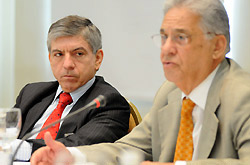
Commission panel, former President of Colombia Cesar Gaviria on left (courtesy comunidadsegura.org)
In February, a blue-ribbon panel of Latin American leaders, including former Brazilian President Fernando Henrique Cardoso, former Mexican President Ernesto Zedillo, and former Colombian President Cesar Gaviria issued a report and
statement saying the US-led war on drugs has failed and it is time to consider new policies, particularly treating drug use as a public health matter and decriminalizing marijuana possession.
The report, Drugs and Democracy: Toward a Paradigm Shift, is the work of the Latin American Commission on Drugs and Democracy, which also includes prominent writers Paulo Coelho, Mario Vargas Llosa, Sergio RamÃrez and Tomás Eloy MartÃnez as well as leading scholars, media members and politicians.
Latin America is the leading exporter of both cocaine and marijuana. As such, it has faced the ravages of heavy-handed American anti-drug interventions, such as Plan Colombia and earlier efforts to destroy the Bolivian coca crop, as well as the violence of drug trafficking organizations and politico-military formations of the left and right that have grown wealthy off the black market bonanza. And while the region's level of drug consumption has historically been low, it is on the rise.
"The main reason we organized this commission is because the available evidence indicates the war on drugs is a failed war," said Cardoso at a February press conference in Rio de Janeiro to announce the report. "We need a different paradigm to cope with the problem of drugs. The power of organized crime is undermining the very foundations of democracy in some Latin American countries. We must acknowledge that these policies have failed and we must break the taboo that prevents us from discussing different strategies."

''Global Marijuana Day'' demonstration in Mexico City, May 2008
The report garnered considerable attention, not only in the US and Latin America, but worldwide, and it set the tone for a very reformist year in Latin America.
Mexico Decriminalizes Drug Possession
In May, Mexico decriminalized the possession of small amounts of illicit drugs, including up to five grams of marijuana, a fifth-gram of ecstasy and methamphetamine, a tenth-gram of heroin, and a half-gram of cocaine. The new law closely resembled a 2006 decriminalization bill that had passed the legislature only to die in the face of US protests. There were no US protests this time.
With the Mexican government's action, drug decriminalization has now reached the very borders of the US.
But, according to well-placed observers, the Mexican decriminalization is a case of two steps forward, one step back. In addition to decriminalizing possession of very small amounts of drugs, the new law grants drug enforcement powers to state and local police forces that they never had before. That could mean an increase in the arrests and prosecution of retail-level drug sellers. Still, the long-term political ramifications could be helpful; as one observer noted, "the headline will read that Mexico decriminalized drugs."
Argentina Decriminalizes Marijuana Possession, Laws Against Possessing Other Drugs Tremble

Supreme Court of Argentina
While Mexico decriminalized through the legislative process, Argentina is doing it through the courts. In a series of cases dating back to 2006, Argentine judges have grown increasingly skeptical of arguments for criminalizing drug use.
In the spring, judges in Buenos Aires threw out marijuana cultivation charges against a defendant, saying the plants were for personal use, and the following month, a federal appeals court threw out ecstasy possession charges against a group of defendants, again saying the drugs were for personal use. In both cases, the courts cited a 2006 Argentine Supreme Court ruling that it was the burden of the state "to demonstrate unequivocally that the drugs were not for personal use." In the ecstasy case, the appeals court held that the portion of the country's drug law regarding drug possession must be declared unconstitutional.
In August, the Supreme Court did just that, using another marijuana possession case to rule that the section of the country's drug law that criminalizes drug possession is unconstitutional. While the ruling referred only to marijuana possession, the portion of the law it threw out makes no distinction among drugs.
Imprisoning people absent harm to others violates constitutional protections, a unanimous court held. "Each individual adult is responsible for making decisions freely about their desired lifestyle without state interference," their ruling said. "Private conduct is allowed unless it constitutes a real danger or causes damage to property or the rights of others. The state cannot establish morality."
"It is significant that the ruling was unanimous," said Martin Jelsma, coordinator of the Drugs and Democracy program at the Transnational Institute, which has worked closely with Latin American activists and politicians on drug reform issues. "It confirms the paradigm shift visible throughout the continent, which recognizes that drug use should be treated as a public health matter instead of, as in the past, when all involved, including users, were seen as criminals."
UN's Global Anti-Drug Bureaucracy Meets Organized Resistance

demonstration at the UN drug meeting, Vienna
It wasn't like this a decade ago, the last time the UN General Assembly Special Session on drugs took place. This year, for the first time, the UN's global anti-drug bureaucracy ran into organized resistance when its
Committee on Narcotic Drugs (CND) met in March in Vienna. Not only did a large contingent of drug reform, human rights, and public health NGOs show up to challenge global prohibitionist orthodoxy, they were joined by a number of European and Latin American countries showing serious signs of defecting from the half-century old prohibitionist consensus.
In the end, the CND issued a political statement and plan of action that largely reaffirmed existing prohibitionist policies and ignored harm reduction, but with some victories for reformers both substantive and symbolic. For one, the US delegation finally removed its objection to needle exchanges.
But if the global anti-drug bureaucracies ignored their critics in their report, they were impossible to ignore in Vienna. Demonstrations took place outside the meeting hall, and Bolivian President Evo Morales brandished then chewed coca leaves as he demanded that his country's sacred plant be removed from the list of proscribed substances.
Even UN Office on Drugs and Crime head Antonio Maria Costa was forced to publicly acknowledge the failures and unintended consequences of prohibition. In his address opening the session, Costa bravely argued that "drugs are not harmful because they are controlled; they are controlled because they are harmful," but was forced to concede that prohibition had created a dire situation in some places. "When mafias can buy elections, candidates, political parties, in a word, power, the consequences can only be highly destabilizing" he said. "While ghettoes burn, West Africa is under attack, drug cartels threaten Central America and drug money penetrates bankrupt financial institutions."
All the more reason to challenge prohibitionism and its consequences. After this year, the global anti-drug bureaucracy knows that not only is its long-held consensus under assault, it is beginning to crack.
Czech Republic Decriminalizes Drug Possession, Finally Sets Quantity Limits

Czech marijuana reform demonstration, 2005 (courtesy Michal Vlk)
Following in Portugal's footsteps, authorities in the Czech Republic voted late last year to decriminalize the possession of "smaller than large amounts" of drugs. But that term was vague, leaving its interpretation up to police and prosecutors and resulting in situations where people like personal marijuana growers were being charged as traffickers.
This month, Czech authorities formalized "smaller than large amounts." The new guidelines mean Czechs will suffer neither arrest nor prosecution for up to 15 grams or five marijuana plants, five grams of hashish, 40 magic mushroom segments, five peyote plants, five LSD tablets, four ecstasy tablets, two grams of amphetamine or methamphetamine, 1.5 grams of heroin, five coca plants, or one gram of cocaine.
The new quantity rules go into effect on January 1.
Science vs. Politics in Great Britain
The British Advisory Council on the Misuse of Drugs (ACMD) is an official body charged with providing evidence-based analysis of drug policy issues for the British Home Office. Tensions between the ACMD and the Labor government of Prime Minister Gordon Brown had been on the rise since it rejected the ACMD's recommendation that marijuana, which had been down-scheduled from a Class B to a Class C (least harmful) drug under Brown's predecessor, Tony Blair, remain at Class C. The government instead up-scheduled it back to Class B.

David Nutt
The ACMD was slighted again in February, when it recommended that ecstasy be down-scheduled from Class A (most harmful) to Class B, only to have
the Home Office reject that recommendation the same day. ACMD head Professor David Nutt also drew heated criticism from the Home Office -- as well as Britain's horsey set -- for heretically suggesting that ecstasy was safer than horse-riding. Nutt was forced to apologize for his remarks.
After a relatively quiet summer, the clash between drug science and drug politics exploded anew when Home Secretary Alan Johnson fired Nutt in late October for again criticizing the government's refusal to follow the science-based recommendations of the panel. That firing caused a huge fire storm of protest, including the resignations of at least six ACMD members, and was splashed across newspaper front pages for weeks.
Now, the credibility of the Labor government and its adherence to evidence-based policy-making have been called into serious doubt, as it becomes clear that Home Office drug scheduling decisions are driven by a political calculus, not a scientific one. And if the Home Office thought firing Nutt was going to make him go away, it was sadly mistaken. Nutt is maintaining a high public profile and is vowing to set up his own independent drug panel.
Whither Holland's Cannabis Coffee Shops?

downstairs of a Maastricht coffee shop (courtesy Wikimedia)
This year has seen the long-running battle over the Netherland's famous cannabis coffee shops continue to escalate. Under the Dutch policy of "gedogen," or pragmatic tolerance, marijuana remains technically illegal in Holland, but the sale and possession of small amounts is tolerated and even regulated.
But that tolerant policy is not a favorite of the conservative coalition national government, and it has created a number of problems. "Drug tourism," as the influx of border town marijuana buyers from more repressive neighboring countries is known, has led to everything from traffic jams to public urination to lurking hard-drug peddlers.
And Holland's halfway approach to marijuana policy -- it does not allow for the regulated provision of marijuana to the coffee houses -- has led to the "backdoor problem," in which coffee shop proprietors must rely on criminal-by-definition suppliers to provide them with their product. That provides additional ammunition for the anti-coffee shop crowd.
The conservative coalition government, however, is split on how best to rein in the coffee shops and has promised not to take action at the national level until after the 2010 elections. That has left the field to local authorities, and they have responded.
In March, the "drug tourism" problem resulted in the announcement by the mayors of Roosendaal and Bergen op Zoom that they would close all the coffee shops in their towns by September. In May, the mayors of the eight towns in the border province of Limburg announced coffee shops would be "members only." In August, the Dutch government announced it was providing more than $200,000 for a pilot "members only" program in the border town of Maastricht. Court challenges from coffee shop owners have so far failed to stop any of this.
Meanwhile, in Amsterdam, an urban renewal plan unveiled in May called for a reduction in coffee shops there from 226 to 192, with a 50% reduction in the number of coffee shops in the central Red Light District. But just last week, Amsterdam Mayor Job Cohen fought back, saying that national coffee house policy should not be based solely on border "drug tourism" concerns, that he opposed the "members only" option, and that he rejected a ban on coffee houses within 250 yards of schools.
Holland's marijuana coffee shops have been around for more than 30 years now, but as was made clear this year, they will continue to be a battle front between the forces of Dutch conservatism and Dutch liberal pragmatism.
Heroin Maintenance Continues to Spread

maintenance programs can make heroin addiction cleaner and safer
This year saw a continuation of the slow spread of heroin maintenance programs for severely addicted users unamenable to other forms of drug treatment. At the beginning of the year, permanent or pilot heroin prescription programs were in place in Britain, the Netherlands, Spain, and Switzerland.
Denmark joined the club in February and Germany came aboard in June. These moves come after Switzerland voted in a popular referendum last year to move from a pilot to a permanent heroin maintenance program, based on favorable results from the pilot program.
Canada is about to join the club, too. After the success of the three-year North American Opiate Maintenance Initiative (NAOMI) in Vancouver, Canadian researchers are moving forward with SALOME (the Study to Assess Long-term Opiate Maintenance), a pilot heroin maintenance program set for Vancouver and Montreal. But as of late last month, Montreal's participation was a question mark after Quebec authorities said they would not pay their share of program costs.
Despite lingering political distaste for heroin by prescription, the body of evidence demonstrating its efficacy -- in terms of users' quality of life, public health, and public safety -- continues to grow. There has even been some discussion of bringing a heroin maintenance pilot program to the US. Dr. Peter Reuter, the renowned University of Maryland drug policy expert, authored a study this summer about the possibility of a pilot program in Baltimore.
There is an old saw about not being able to turn an ocean liner on a dime. That's certainly true when it comes to changing drug policies for the better at the national or international level. But each year, it seems that more progress is being made. Let's see what 2010 brings.
back to top
Eleven years after District of Columbia voters approved a medical marijuana initiative with 69% of the vote, Congress has finally stepped aside and will allow DC to implement the will of the people. The US Senate Sunday vote to approve the omnibus appropriations bill was the final step in removing language by former Rep. Bob Barr (R-GA) from the DC appropriations bill that had barred the District from implementing the results of the 1998 vote. President Obama signed the bill into law Wednesday.
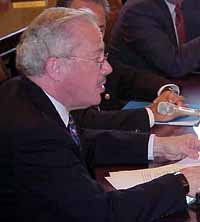
Bob Barr, lobbied to repeal anti-medical marijuana legislation he wrote
DC will shortly join the 13 states that currently have medical marijuana laws. But unlike some states that have joined the ranks more recently, the language of the DC initiative is relatively loose. It allows "all seriously ill individuals... to obtain and use marijuana for medical purposes when a licensed physician has found the use of marijuana to be medically necessary."
The measure allows patients or up to four caregivers to grow, buy, and possess marijuana for medicinal use. It also permits the establishment of nonprofit dispensaries and orders DC health officials to devise a plan to distribute marijuana to patients.
DC officials say they want to move quickly to set up regulations. DC Council Chairman Vincent Gray (D) told the Washington Post Monday that after more than a decade, this was no time for delay. "We've waited 10 years. I think the opportunity to send it is now," Gray said. "There is no reason to sit on it."
DC Attorney General Peter Nickles, however, throw up a couple of potential roadblocks. He told the Post he has instructed his staff to determine whether the initiative language is too dated to stand up to legal challenge. He also warned that the initiative would have to survive a 30-day congressional review period because the original measure had never been sent to Congress.
But DC non-voting congressional delegate, Eleanor Holmes Norton (D-DC), told the Post the measure did not need further congressional review. "Congress thought they were simply taking the ban off and the District would simply proceed or not proceed," Norton said. "After all we have gone through, I can tell you, the Congress is not anxious to see this issue here again. It's taken me 10 years."
It's not just DC bureaucrats who are scrambling. Allen St. Pierre, executive director of the National Organization for the Reform of Marijuana Laws told the Post he has been fielding numerous enquiries from would-be DC medical marijuana businessmen. "There are probably at least 20 of these cannabis shop owners on the West Coast that have a dead-eye target on the District," St. Pierre said. "Over the weekend, we must have gotten 20 to 30 e-mails or phone messages from people I would say are entrepreneurs."
back to top
 Dear drug policy reformer,
Dear drug policy reformer,
Did you know that we are WINNING?
No, I'm not joking. Yes, there's a long, hard road still ahead. Many lives will be damaged -- some ruined -- by repressive, prohibitionist drug policies in the meantime. Nevertheless, things are moving in our direction:
- Medical marijuana dispensaries are now expanding to more states than just California -- east coast, Rockies, even Midwest.
- Congress is moving on a range of important reforms -- three this very week -- that had previously been stuck for years.
- Major media outlets are contacting us asking who the famous and important people are calling for legalization of drugs.
This is a critically important moment, and so I'm writing today to ask you to step up to the plate for drug policy reform with a contribution of $36, $60 or $100 to our 2009 "Changing Minds, Laws & Lives" campaign. Please join us and be a part of changing drug laws today!
|

Donate $36 or more and
you can choose any of
our premium items --
books, videos, t-shirts
about the failure of
prohibition, more.
|
With nearly two million unique visitors to our web site every year, many of them journalists, policymakers and advocates themselves, StoptheDrugWar.org (DRCNet) is playing a unique and important role in forwarding the drug war and legalization debates, building the drug policy reform movement, and advancing long-term legislative goals.
Your participation at this point in history is very important, and I'd like to send you some free gifts to show our appreciation.
For a contribution of $36, you can choose any of our many current membership premiums -- books, videos, t-shirts about the failure of drug prohibition, more. For a gift of $60 or more, you can pick any two items. For a contribution of $100 or more, pick any three.
By joining today, you will make an immediate impact by helping StoptheDrugWar.org:
- Continue to reach major media figures like John Stossel and Andrew Sullivan with important information about drug war injustices and policies.
- Build up our recently-launched News Demonstration Project.
- Complete our Online Legislative Center.
- Mobilize the campaign to roll back aggressive drug war policing, starting with the overuse of SWAT teams.
- Finish our web site expansion making StoptheDrugWar.org a true one-stop shop for all things drug policy.
- Do all the things we've been doing for years to build the drug policy reform movement, reach hundreds of thousands of people online each month with the anti-prohibitionist message and more.
 What you and I and our friends are doing together is working. We can't back off now. By taking advantage of the opportunity we have during this pro-reform climate, we can change minds, change laws and, most importantly, change good people's lives for the better.
What you and I and our friends are doing together is working. We can't back off now. By taking advantage of the opportunity we have during this pro-reform climate, we can change minds, change laws and, most importantly, change good people's lives for the better.
Thank you very much,

David Borden
Executive Director, StoptheDrugWar.org (DRCNet)
P.S. Thank you for your interest in the cause of ending prohibition and the drug war. Now is the perfect time to galvanize support across the country and prove that prohibition does not work. Please send in your gift today! Thank you!
back to top
Two leading advocates of marijuana legalization at the statehouse came out swinging during a Thursday press conference to push the issue forward. Assemblyman Tom Ammiano (D-San Francisco), author of AB 390, the California legalization bill, and Rep. Roger Goodman (D-Kirkland), cosponsor of HB 2401, the Washington state legalization bill, both said the time to legalize marijuana has come.
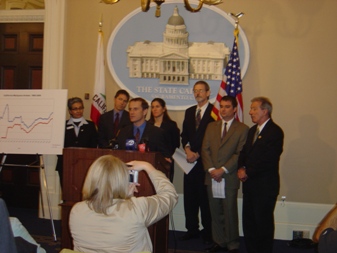
Ammiano press conference for AB 390
"We're very excited, we've gained a lot of traction, and the political will seems to be there," said Ammiano, whose bill has already had one committee hearing and heads for an Assembly Public Safety Committee vote next month. "There also seems to be a populist dimension, as evidenced by the legalization initiative, which has qualified for the ballot."
Ammiano was referring to the Tax and Regulate Cannabis 2010 initiative sponsored by Oakland medical marijuana entrepreneur Richard Lee, which formally announced this week that it had secured sufficient signatures to make the November 2010 ballot. (The Chronicle reported on that story two weeks ago.
"My bill would generate much needed revenue for the state," Ammiano continued. "We are in an historic economic and fiscal crisis, and taxing marijuana is just common sense."
But, Ammiano added, it isn't all about the dollars. "This is not just about the revenue," he said, "this is a social justice issue. People of color, specifically African-Americans, are being disproportionately arrested," the San Francisco assemblyman charged.
While opponents of legalization want to talk about its social costs, said Ammiano, that argument needs to be turned around. "We need to be talking about the social costs or prohibition," he said. "As a parent and grandparent, I'm concerned about the easy access that young people have, and I'm concerned about the chaos that prohibition brings, which is what we now have in California."

Roger Goodman
If the California legislature is moving toward legalization, Washington's is right behind it, said Goodman, who represents a suburban Seattle district, and whose day job when the legislature is out of session is headingthe King County Bar Association's Drug Policy Project. "We're following California's lead," Goodman said. "This is an issue that has been simmering and is now ripe for public discussions. Finally, rationality is being allowed in this discussion."
Goodman said he didn't intend to waste his time on a bill that had no chance of passage. "If we didn't think we could do this, we wouldn't be doing it at all," he said. "This is not an idle effort."
Marijuana legalization addresses a whole set of legitimate public policy objectives, said Goodman. "Let's protect our children, let's get it off the streets, let's be fiscally responsible," he said. "Let's talk regulation instead of prohibition because we can't afford that anymore. This issue has been sexy too long; it's time to make it boring. Let's talk about a regulatory framework for cultivation and sales and about storage and about quality control and about times and places for sales, the same way we talk about controlling liquor and pharmaceuticals."
The Washington bill, which was pre-filed for next year's session earlier this month, has not, naturally enough, advanced as far as Ammiano's California bill. But Goodman said it would move and could be modified during the legislative process. "We need public input into the rulemaking," he said. "This bill is a work in progress."
California and Washington are not the only states with active marijuana legalization efforts. In the Northeast, both Vermont and Massachusetts saw bills introduced this year. But despite rising support nationwide for legalization, the West Coast still seems the best bet.
"Polls show increasing levels of public support all around the country for making marijuana legal," said Julie Harris, managing director of public policy for the Drug Policy Alliance (DPA), which arranged the press conference. "Marijuana is increasingly seen as a mainstream substance used recreationally and unproblematic ally by millions of Americans. We see tremendous momentum in favor of making marijuana legal, yet we still see 850,000 Americans arrested for it every year," Harris noted.
"With so many states facing fiscal crises and draconian budget cuts, why are we wasting our precious law enforcement resources on nothing more serious than using marijuana?" Harris asked. "It's time we move toward a system of reasonable regulation."
Legalization needn't worry about federal marijuana prohibition, said DPA staff attorney Theshia Naidoo. "There is nothing in federal law that requires states to criminalize any particular conduct," she said. "States have the ability to decide what conduct is illegal or not under state law. The federal Controlled Substances Act criminalizes the possession, cultivation, and sale of marijuana under federal law, but does not compel the states to criminalize marijuana," Naidoo argued.
"The federal government may criminalize marijuana, but it cannot force the states to criminalize or to enforce federal prohibition," she reiterated. "The states are free to opt out of federal marijuana prohibition."
California looks to be the first state likely to break with federal prohibition -- either through the legislature or at the ballot box -- but cracks in the dam of pot prohibition are starting to show up elsewhere as well.
back to top
by Bernd Debusmann, Jr.
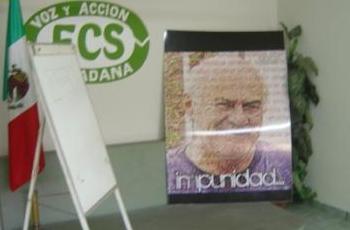
poster of assassinated human rights advocate Ricardo Murillo
Mexican drug trafficking organizations make billions each year trafficking illegal drugs into the United States, profiting enormously from the prohibitionist drug policies of the US government. Since Mexican president Felipe Calderon took office in December 2006 and called the armed forces into the fight against the so-called cartels, prohibition-related violence has killed over 16,000 people, with a death toll of over 7,000 so far in 2009. The increasing militarization of the drug war and the arrest of several high-profile drug traffickers have failed to stem the flow of drugs -- or the violence -- whatsoever. The Merida initiative, which provides $1.4 billion over three years for the US to assist the Mexican government with training, equipment and intelligence, has so far failed to make a difference. Here are a few of the latest developments in Mexico's drug war:
Saturday, December 12
In the town of Almoloya, near Mexico City, six members of a family were killed by gunmen who attacked their home in the morning. Gunmen entered their home, locked several children in a bedroom, then lined up and shot the six adults, three men and three women ranging in ages from 25 to 52. Two bodies were also found in the nearby town of Villa Victoria, although it is unclear if these two incidents are related.
In Guadalajara, a prep school teacher was shot and killed by two gunmen as he drove to work. In Culiacan, Sinaloa, two women with their hands and feet bound were found executed. 16 people were killed in Ciudad Juárez, including a police official. In Michoacan, police found the bodies of three suspected cartel members, who were found dead in a car that contained weapons of various calibers. Six people were also killed in Tijuana, and five in Durango.
Monday, December 14
The spokesman for the Catholic Archdiocese of Mexico called on the Mexican army to withdraw from the streets of Mexican cities. The spokesman, Hugo Valdemar, called on more effective police forces to be created. He also said that local authorities "cannot count on the army," and said that "unfortunately, the army is committing human rights violations" in its fight against organized crime. The same day as his statements, two law enforcement facilities in Durango were attacked by grenades.
Tuesday, December 15
Seven people were killed in Tijuana, bringing the total number of murders in the city to 23 in four days. Among the dead was a man found by commuters hanging by his hands from a bridge over the Tijuana-Playas de Rosarito highway. In Ciudad Juárez, ten men and one woman were killed in several incidents across the city. In the state of Aguacalientes, a woman was found murdered, along with a note accusing her of being an informant. Near Nogales, six bodies were found dumped in a construction site. In the same time period, three people were killed in Sinaloa, three in Guerrero, and one (a 17-year old boy) outside Mexico City.
Wednesday, December 16
In a major coup for the government, Beltran Leyva cartel leader Arturo Beltran Leyva was killed along with two other cartel members when members of the Mexican Navy attacked their apartment in a luxury quarter of Cuernavaca. One Mexican sailor also died in the 90 minute-long gun battle.
Ricardo Chavez Aldana, a reporter for the Ciudad Juárez radio station Radio Cañón fled to El Paso with his family and requested political asylum. Two nephews of his were recently killed in Ciudad Juárez and his family had received death threats. He is the fourth Ciudad Juárez journalist to seek asylum in the US. In the last nine years, 56 journalists have been killed in Mexico. Most of the killings remained unsolved.
In Tijuana, gunmen armed with assault rifles killed four men in a taco store. Several people were wounded in the attack. The day before, the bodies of four decapitated men were found in the city, and four other people were killed by gunfire, including one woman. These killings brought to 35 the number of people murdered in Tijuana since Friday. The reasons for the sudden spike in violence are unclear, although much of the violence in Tijuana is due to the intense rivalry between the Arellano-Felix Organization (AFO) and a breakaway faction that has allied itself with the Sinaloa Cartel.
In Ciudad Juárez, 18 people were killed in a 24-hour period. In one incident, five men were killed when a home was attacked by a group of gunmen. The five men attempted to flee, but were gunned down in the courtyard. In another incident, two men were killed by gunmen wielding AK-47's.
In Guerrero, body parts belonging to two individuals were found inside plastic bags. A note was found near the bag which threatened kidnappers and was said to be from "the boss of bosses". This nickname is thought to belong to Arturo Beltran-Leyva, one of the heads of the Beltran-Leyva organization. The note also implored the local population not to be alarmed by the killings.
Body Count for the Week: 221
Body Count for the Year: 7,277
Read the last Mexico Drug War Update here.
back to top
A quiet week -- perhaps it's the holidays -- yields a Carolina two-fer of corrupt cops. Let's get to it:
In Darlington, North Carolina, a Darlington police officer was arrested Monday on drug trafficking charges. Officer Dominique Robinson is charged with possession of marijuana with intent to distribute. Robinson had been serving as a school resource officer for the police department. At last word, Robinson was in jail awaiting a bond hearing.
In Chesterfield, South Carolina, a Chesterfield County Sheriff's deputy was arrested December 3 on federal drug charges. Deputy Albert Surratt III went down after a joint local-state-federal investigation. He and one other man are charged with conspiracy to manufacture methamphetamine. He is also charged with possession of a firearm during a drug crime.
back to top
New Jersey Multiple Sclerosis patient John Ray Wilson, whose case the Chronicle profiled last week, was found guilty Thursday of manufacturing marijuana and a separate charge of possession of psychedelic mushrooms. But the jury found him not guilty of the most serious charge against him -- maintaining a facility to manufacture marijuana -- which could have seen him sent to prison for 20 years.
Wilson's case had gotten widespread attention, both because a bill that would have legalized his actions as a medical marijuana patient is nearing passage in the New Jersey Assembly and because the trial judge had earlier ruled that he could not mention medical marijuana or his disease in his defense. In a surprise move yesterday, the judge allowed Wilson to mention that he used marijuana because he suffers from MS, but that brief testimony did not sway the jury.
"I told them (the arresting officers) I was not a drug dealer and I was using the marijuana for my MS(Multiple Sclerosis)," Wilson testified yesterday after multiple sidebar conferences between Judge Robert Reed, prosecutors, and defense attorneys.
But no follow-up was allowed, and the defense was given no chance to expand on Wilson's single-sentence statement.
Wilson was arrested last year after a National Guard helicopter on a training flight spotted plants growing in the back yard of his Franklin Township home. Summoned by the pilot, police arrived at the unemployed 36-year-old's home and arrested him.
Two state senators, Nicholas Scutari, sponsor of the medical marijuana bill, and Ray Lesniak, two months ago called on Gov. Jon Corzine to pardon Wilson. But Corzine punted, saying he preferred to wait until after Wilson's trial had finished. Well, now it's done... and?
back to top
A Wisconsin bill that would allow seriously ill patients to grow up to 12 marijuana plants or purchase up to three ounces of marijuana from nonprofit dispensaries got a public hearing Tuesday. The bill, AB 554 (and its companion SB 368) was introduced a little more than a month ago, but after a decade of preparation and statehouse hall-walking by the state patients' group Is My Medicine Legal Yet? (IMMLY), it is moving fast. Tuesday's hearing was a joint hearing of the Assembly and Senate Health Committees.
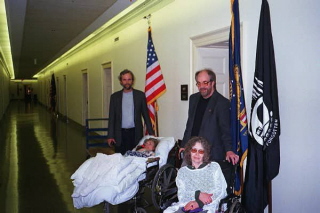
Wisconsin's Jacki Rickert and Gary Storck, with New Jersey's Jim and the late Cheryl Miller (photo courtesy immly.org)
IMMLY's Jacki Rickert, of Mondovi, who suffers from a connective tissue disorder, has long been a poster child for Wisconsin medical marijuana patients. On Tuesday, she urged lawmakers to make her medicine legal, saying it allowed her to reduce her consumption of morphine for pain.
"When your doctor looks at you and says, 'If we cannot get weight on you, you will die' - that's what it comes down to, 'You will die' -- you do whatever you have to do," Rickert, 58, told the lawmakers. "We've never wanted to break the law, but sometimes you have to."
Both houses of the Wisconsin legislature are controlled by Democrats, but that didn't stop Republican skeptics from blasting away. Republican Attorney General JB Van Hollen played the "but it's a federal crime" card.
"Make no mistake, the marijuana possession permitted by the bill to a user or caregiver is illegal under federal law, with penalties of up to five years in prison and a fine of up to $250,000," Van Hollen said in written testimony -- completely ignoring the Obama administration's vow to not prosecute people using medical marijuana in compliance with state law.
Such a law would also make it more difficult to prosecute marijuana cases in state court, Van Hollen complained. People could claim they had a medical condition, even if they were not on the state registry, he said. "If the bills are enacted as drafted, law enforcement's and prosecutors' ability to enforce what would still be illegal is seriously disabled," he warned.
Rep. Pat Strachota (R-West Bend) argued that the bill was too broadly written, citing a Department of Health Services estimate that 2.5 million Wisconsinites have medical conditions that would qualify them to use medical marijuana. The agency estimated that only a fraction of that number -- from 1,700 to 17,000 people -- would actually register as medical marijuana patients.
But that didn't stop Strachota. "That is not really a narrow scope on this bill if half the citizens of the state would qualify to use medical marijuana," he said.
But proponents of the bill argued that it was tightly crafted to avoid the kind of loopholes that have turned California into a medical marijuana Wild West. The bill is the "most comprehensive and responsible legislation in the country," said Daniel Abrahamson, director of legal affairs for the Drug Policy Alliance Network, the lobbying arm of the Drug Policy Alliance.
Rep. Leah Vukmir (R-Wauwatosa) attacked the motives of advocates, claiming supporters were cynically using critically ill patients as a "façade" for legalization. "It's nothing more than a ruse for you to move forward for full legalization of marijuana," Vukmir said, drawing loud boos from the hearing audience.
Vukmir's comments also stirred Senate bill sponsor Sen. Joe Erpenbach (D-Waunakee) to insist that he was not trying to legalize marijuana for recreational use. "People shouldn't have to break the law to get pot for their mom or dad or son. Republicans and Democrats are doing that right now -- in your district, right in your backyard," Erpenbach told Vukmir.
Despite the Republican attacks, supporters of the bill think it can pass the legislature quickly. Rep. Mark Pocan (D-Madison), lead author of the bill, said he was confident it would pass the Assembly Health Committee and get an Assembly floor vote, while Senate Majority Leader Russ Decker (D-Weston) has signaled that he will allow a Senate floor vote on the bill. Gov. Jim Doyle (D) has said he supports medical marijuana.
Thirteen states currently have medical marijuana laws. The District of Columbia is about to be the 14th such jurisdiction, as officials there scramble to come up with a regulatory regime for the 11-year-old medical marijuana law that will only now be implemented after Congress ended a long-standing ban against spending District funds to do so. And New Jersey could be number 15, if, as expected, the Assembly votes to approve it next month.
back to top
The Ohio Supreme Court ruled Tuesday that police officers must obtain a search warrant before reviewing the contents of a suspect's cell phone unless their safety is in danger. The ruling came on a narrow 5-4 vote of the justices.

hands off, at least in Ohio
The ruling came in
State v. Smith, in which Antwaun Smith was arrested on drug charges after answering a cell phone call from a crack cocaine user acting as a police informant. When Smith was arrested, officers took his cell phone and searched it without his consent or a search warrant. Smith was charged with cocaine possession, cocaine trafficking, tampering with evidence and two counts of possession of criminal tools.
At trial, Smith argued that evidence derived through the cell phone search should be thrown out because the search violated the Fourth Amendment ban on unreasonable searches and seizures. But the trial judge, citing a 2007 federal court ruling that found a cell phone is similar to a closed container found on a defendant and thus subject to warrantless search, admitted the evidence. Smith was subsequently convicted on all charges and sentenced to 12 years in prison.
Smith appealed, but lost on a 2-1 vote in the appeals court. In that decision, the dissenting judge cited a different federal court case that found that a cell phone is not a container.
In the majority opinion Tuesday, state Supreme Court Justice Judith Ann Lanzinger wrote that the court did not agree with the appeals court and trial judge that a cell phone was a closed container. "We do not agree with this comparison, which ignores the unique nature of cell phones," Lanzinger wrote. "Objects falling under the banner of 'closed container' have traditionally been physical objects capable of holding other physical objects. ... Even the more basic models of modern cell phones are capable of storing a wealth of digitized information wholly unlike any physical object found within a closed container."
"People keep their e-mail, text messages, personal and work schedules, pictures, and so much more on their cell phones," Craig Jaquith, Smith's attorney, said in a statement. "I can't imagine that any cell phone user in Ohio would want the police to have access to that sort of personal information without a warrant. Today, the Ohio Supreme Court properly brought the Fourth Amendment into the 21st century."
But Greene County prosecutor Stephen Haller complained to the Associated Press that the high court had gone too far. "I'm disappointed with this razor-thin decision," Haller said. "The majority here has announced this broad, sweeping new Fourth Amendment rule that basically is at odds with decisions of other courts."
back to top
The
Czech cabinet Monday approved a Justice Ministry proposal that sets personal use quantity limits for illicit drugs under a penal code revision that decriminalizes drug possession in the Czech Republic. The law and its quantity limits will take effect on January 1.
The Czech government had approved the decriminalization law late last year, but failed to set precise quantities covered by it, instead leaving it to police and prosecutors to determine what constituted a "larger than small" amount of drugs. The resulting confusion -- and the prosecution of some small-scale marijuana growers as drug traffickers -- led the government to adopt more precise criteria.
Under the new law, possession of less than the following amounts of illicit drugs will not be a criminal offense:
| | Marijuana | 15 grams (or five plants) |
| | Hashish | 5 grams |
| | Magic mushrooms | 40 pieces |
| | Peyote | 5 plants |
| | LSD | 5 tablets |
| | Ecstasy | 4 tablets |
| | Amphetamine | 2 grams |
| | Methamphetamine | 2 grams |
| | Heroin | 1.5 grams |
| | Coca | 5 plants |
| | Cocaine | 1 gram |
Possession of "larger than a small amount" of marijuana can result in a jail sentence of up to one year. For other illicit drugs, the sentence is two years. Trafficking offenses carry stiffer sentences.
Justice Minister Daniela Kovarova said that the ministry had originally proposed decriminalizing the possession of up to two grams of hard drugs, but decided that limits being imposed by courts this year were appropriate. "The government finally decided that it would stick to the current court practice and drafted a table based on these limits," Kovarova said.
The Czech Republic now joins Portugal as a European country that has decriminalized drug possession. Drug possession is also decriminalized de facto if not de jure in the Netherlands, and actual charging and prosecution practices in some other European countries already approach decriminalization in practice, if not as a matter of law.
back to top
A highly placed Jamaican lawmaker called over the weekend for the decriminalization of marijuana possession. Sen. Dennis Meadows, deputy secretary general for the governing Jamaica Labor Party, made the call before parliament Friday and elaborated on it Saturday.

Dennis Meadows
On Friday, Meadows told the Jamaican Senate that arresting and convicting people for possession of small amounts of marijuana "is only serving to criminalize our already marginalized young men and women, thereby creating a reservoir of hopelessness."
Prosecuting people for possessing a spliff is also a waste of valuable law enforcement resources, he said. "Decriminalization, among other things, will serve to free up the police resources and the already stressed justice system to focus on more serious crimes," Meadows insisted.
Meadows cited the 2001 National Commission on Ganja report, which also called for decriminalization. Although that report was presented to parliament and then Prime Minister PJ Patterson, movement toward decrim withered under loud US protests. Debate on the report should be reopened, Meadows told his colleagues.
On Saturday, Meadows issued a statement reiterating his stance. "What I am advocating is that ganja, at the level of spliffs for private use, be treated similarly to a traffic ticket," Meadows said.
That would be a good start for one of the most marijuana-friendly cultures on the planet. Let's see if the rest of Jamaica's political class is listening.
back to top
December 24, 1912: Merck patents MDMA. Its psychoactive effects remain unknown for more than 60 years, but the drug eventually becomes popularized under the slang term "ecstasy."
December 20, 1989: The US invades Panama with 24,000 soldiers in Operation Just Cause in order to overthrow dictator Manuel Noriega for drug trafficking, money laundering, and selling information to Cuba.
December 23, 1995: A British Medical Journal editorial entitled "The War on Drugs" states, "The British government's drug strategy for the next three years states baldly 'There will be no legalisation of any currently controlled drugs.' But some legalisation would help."
December 24, 1998: The Times (UK) reports that the Prince of Wales expressed an interest in the effectiveness of cannabis in relieving the pain of diseases such as multiple sclerosis. During his annual visit to the Sue Ryder Home in Cheltenham, Gloucestershire, he asked MS patient Karen Drake: "Have you tried taking cannabis? I have heard it's the best thing for it." Drake, 36, said afterwards: "I was surprised but I think I would like at least to try it. Anything that can help relieve the pain can only be for the good."
December 24, 2001: The North Carolina Lexington Dispatch reports the dismissal of 65 criminal cases investigated by three county narcotics officers charged in a federal indictment with conspiracy to distribute drugs. According to a federal affidavit issued in the case, law enforcement officers abused their authority in one or more ways, including writing fake search warrants, planting evidence and fabricating charges, keeping drugs and money seized during arrests, attempting to extort more money from the people arrested, and intimidating suspects and potential witnesses.
December 18, 2002: 108 members of the European Parliament endorse a letter calling on the United Nations and its member states to establish a "system for the legal control and regulation of the production, sale and consumption of substances which are currently illegal."
December 19, 2003: Albert A. Gore III, 21, is arrested for marijuana possession after being stopped for driving a vehicle without its headlights on.
December 22, 2003: The Annenberg School for Communication (ASC) at the University of Pennsylvania releases a report on the Office of National Drug Control Policy's National Youth Anti-Drug Media Campaign. ASC was contracted by ONDCP to analyze the campaign as a whole and their work on marijuana specifically. ASC found there is little evidence that the tens of millions being spent every year are having any discernible impact on use of or attitudes toward marijuana among the nation's youth.
back to top
Do you read Drug War Chronicle? If so, we'd like to hear from you. DRCNet needs two things:
- We are in between newsletter grants, and that makes our need for donations more pressing. Drug War Chronicle is free to read but not to produce! Click here to make a donation by credit card or PayPal, or to print out a form to send in by mail.
- Please send quotes and reports on how you put our flow of information to work, for use in upcoming grant proposals and letters to funders or potential funders. Do you use DRCNet as a source for public speaking? For letters to the editor? Helping you talk to friends or associates about the issue? Research? For your own edification? Have you changed your mind about any aspects of drug policy since subscribing, or inspired you to get involved in the cause? Do you reprint or repost portions of our bulletins on other lists or in other newsletters? Do you have any criticisms or complaints, or suggestions? We want to hear those too. Please send your response -- one or two sentences would be fine; more is great, too -- email [email protected] or reply to a Chronicle email or use our online comment form. Please let us know if we may reprint your comments, and if so, if we may include your name or if you wish to remain anonymous. IMPORTANT: Even if you have given us this kind of feedback before, we could use your updated feedback now too -- we need to hear from you!
Again, please help us keep Drug War Chronicle alive at this important time! Click here to make a donation online, or send your check or money order to: DRCNet, P.O. Box 18402, Washington, DC 20036. Make your check payable to DRCNet Foundation to make a tax-deductible donation for Drug War Chronicle -- remember if you select one of our member premium gifts that will reduce the portion of your donation that is tax-deductible -- or make a non-deductible donation for our lobbying work -- online or check payable to Drug Reform Coordination Network, same address. We can also accept contributions of stock -- email [email protected] for the necessary info.
back to top
Along with our weekly in-depth Chronicle reporting, DRCNet also provides daily content in the way of blogging in the Stop the Drug War Speakeasy -- huge numbers of people have been reading it recently -- as well as Latest News links (upper right-hand corner of most web pages), event listings (lower right-hand corner) and other info. Check out DRCNet every day to stay on top of the drug reform game! Check out the Speakeasy main page at http://stopthedrugwar.org/speakeasy.

prohibition-era beer raid, Washington, DC (Library of Congress)
Since last issue:
Scott Morgan writes: "NJ Medical Marijuana Patient Not Guilty on First-Degree Felony Charges," "There's No Economic Crisis for the Drug Cartels," "Another Crazy Medical Marijuana Lie from the Drug Czar," "NJ Medical Marijuana Trial Takes an Interesting Turn," "'No One Threw Bong Water At Me, But It Came Pretty Close'," "Latest Drug War Lie: Debating Medical Marijuana Causes More Kids to Smoke Pot," "Man Gets Tased and Dies After Trying to Swallow Marijuana During Police Encounter."
Phil Smith posts early copies of Drug War Chronicle articles.
David Guard posts numerous press releases, action alerts and other organizational announcements in the In the Trenches blog.
Again, http://stopthedrugwar.org/speakeasy is the online place to stay in the loop for the fight to stop the war on drugs. Thanks for reading, and please join us on the comment boards.
back to top
Want to help end the "war on drugs," while earning college credit too? Apply for a StoptheDrugWar.org (DRCNet) internship and you could come join the team and help us fight the fight!
StoptheDrugWar has a strong record of providing substantive work experience to our interns -- you won't spend the summer doing filing or running errands, you will play an integral role in one or more of our exciting programs. Options for work you can do with us include coalition outreach as part of the campaign to rein in the use of SWAT teams, to expand our work to repeal the drug provision of the Higher Education Act to encompass other bad drug laws like the similar provisions in welfare and public housing law; blogosphere/web outreach; media research and outreach; web site work (research, writing, technical); possibly other areas. If you are chosen for an internship, we will strive to match your interests and abilities to whichever area is the best fit for you.
While our internships are unpaid, we will reimburse you for metro fare, and DRCNet is a fun and rewarding place to work. To apply, please send your resume to David Guard at [email protected], and feel free to contact us at (202) 293-8340. We hope to hear from you! Check out our web site at http://stopthedrugwar.org to learn more about our organization.
back to top

















